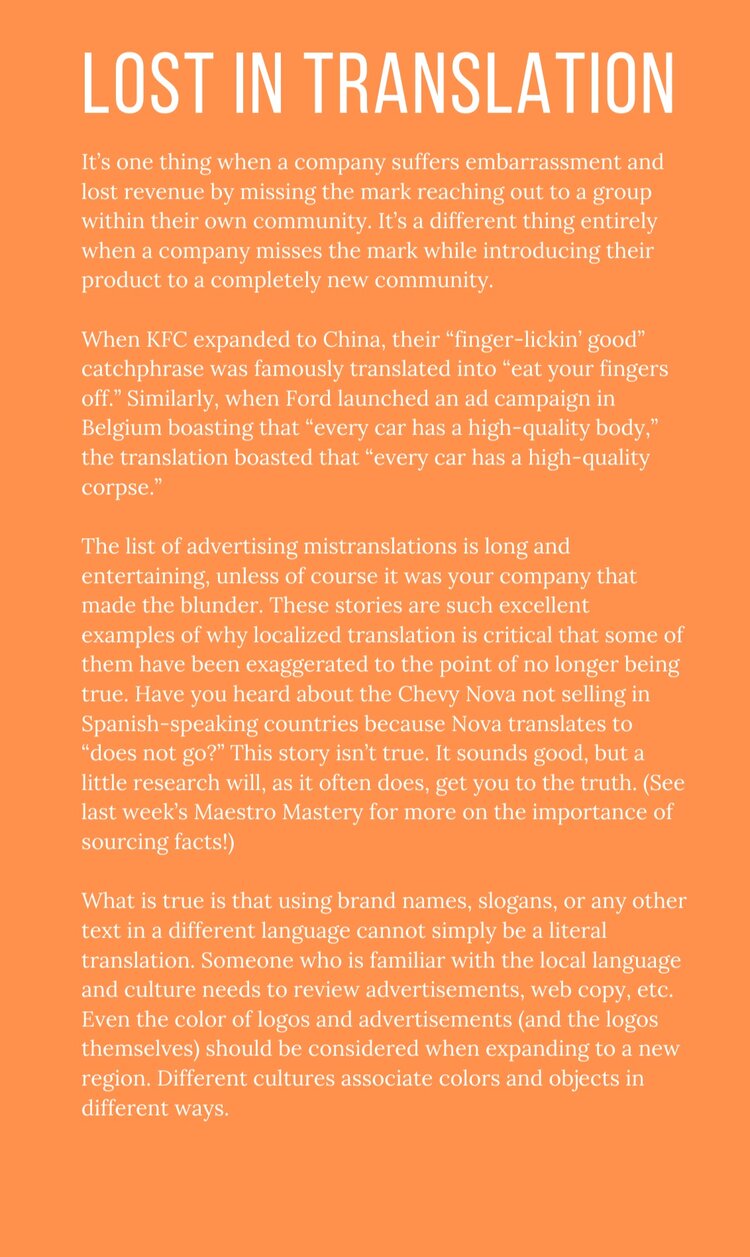Connecting to prospects, customers, and companies requires appreciating their full range of identities.
December 09, 2020
By Rachel Smith
A 2019 McKinsey study looked at diversity within executive teams and whether it impacted performance. Companies in the top quartile in gender diversity were 25 percent more likely to have above-average profitability than those teams in the bottom quartile. Even more impressive, companies in the top quartile for cultural diversity outperformed bottom-quartile companies by 36 percent.
It’s one thing to say you value diversity and another to actually have diversity and yet another to leverage and nurture it. Making a goal to hire more minorities is not going to get you to well-managed diversity. Valuing diversity needs to be part of overall company culture in all sections and at all levels. Gender and race are not the only kinds of diversity, either. It can also include ethnicity, sexual orientation, religious affiliation, generation, disability, personality type, and thinking style.
Why do diverse teams outperform their less-diverse peers? Is diversity just some kind of magic sauce? No. A diverse team is essential to mitigating risk. Here’s why.
It was November 20th, 2013, and I was frantically searching my Target store for Chanukah candles and gift wrap. “Where is your Chanukah end cap?” I asked an employee. “Oh, we don’t have all of our Chanukah stuff yet,” he replied. “It will be out the first week of December.” “But Chanukah starts November 27th,” I told him.
Blank. Stare. Sale…missed.
I understand that there are often not enough Jewish people in specific locations to warrant much in the way of Chanukah necessities. I am resigned to the blue endcap amidst the aisles and aisles of Christmas wrap, ornaments, décor, candy, etc. But not knowing when Chanukah is? That shouldn’t just make me mad. It should make Target Corporate angry, because they just lost all of the money they spent on Chanukah products. From their perspective, spending on poorly-targeted sales and marketing efforts is worse than ignoring a target market altogether.
Admittedly, the Hebrew calendar is weird. Because it’s both lunar and solar, there are leap years, but instead of a single leap day, there is an entire leap month. I don’t expect anyone to understand how it works, but I do expect someone to Google “Chanukah dates 2020.” That’s not very difficult.
What boggles my mind is why a store would attempt to include a minority religion (which we truly do appreciate) but clearly get no input from someone who knows about the needs of the holiday. Many of the attempts to provide Jewish holiday merchandise are extremely misguided. For example:

I only notice the misguided attempts involving Jewish holidays, and I began wondering how often this happens in other attempts at cultural inclusion. How much is cultural ignorance costing across the board? While it’s difficult to put a monetary value on it, mistakes due to cultural ignorance or misunderstanding happen all the time—both when companies try to reach underrepresented groups within their community, and when companies expand to new locations. Some examples are funny. Some are cringe-worthy. And many hurt companies’ bottom lines and reputations.
Just as companies have tried including the Jewish population in an often-misguided way, many have also attempted to reach Muslim populations in the community and had similar results. A Tesco supermarket in London placed the phrase Ramadan Mubarak (great!) on one of their Pringles displays (okaaaay). More specifically…a display of bacon-flavored Pringles (ooooh, bad move).
Yellow Pages made a similar mistake when they posted an image in Toronto’s subway stations with the tagline, “Find out if Bi Bim Bap tastes as fun as it sounds.” Bi Bim Bap is a Korean rice dish, and Toronto is home to the largest Korean population in Canada (great move!). But the image used was a bowl of noodles (ugh). Mistakes like these make a company’s outreach to minorities look insincere. “We want you to buy our stuff, but we don’t have time to learn anything about you,” is the message minorities get.
If you have been part of any of our trainings, you know that one of our major pillars is “mitigate risk.” No matter whether you’re B2B or B2C and no matter what you sell, if you are expanding your business into new areas, understanding the culture is essential in mitigating risk—it’s mitigating the risk of ignorance. Cross-cultural gaffes don’t just cause embarrassment—they can cause lost business.
Based on the work of Dutch social psychologist Geert Hofstede, culture is often divided into six dimensions:
Cultural norms vary along each of these dimensions, and understanding where a society falls on each spectrum can give insight into what ideas will translate well and which might meet resistance. Customer experience is important everywhere, but the same framework will provide a different experience to a client in Japan than to a client in Argentina.

Cultural norms don’t just change how an individual experiences something—they also change how an individual rates that experience. This is critical in understanding customer feedback. Nick Hague, Director at B2B International, has conducted customer-satisfaction studies all over the world, and he notices distinct cultural trends. When using a one to ten scale of customer satisfaction, for example, Americans typically use all of the numbers on the scale, while the Chinese are more likely to use the numbers in the middle and avoid the extremes. You need to have cultural intelligence when working in locations other than your own, and you need it when you assess that work as well.
These norms also affect how people engage with different forms of contact. Different contact channels and even different forms of address are more likely to connect positively with a Gen-Z buyer than with an elderly professor. You’ll navigate these dimensions of the sales process better with a diverse team on your side.
I’ve shared some of the bad attempts at inclusion and globalization, but there are many companies out there doing it well. Salesforce, for example, doesn’t only consider diversity within their company. They are also making efforts to support minority-owned businesses through procurement and investment. Mastercard is addressing generational barriers within the company with a mentorship program that gets older employees more active on social media.
I still have no idea how much money companies lose by assuming that Chanukah coincides with Christmas every year. I do know that cultural mishaps are not new and likely aren’t going away anytime soon. Between a recent trade war and an ongoing global pandemic, understanding global trends and cultures is more critical than ever. Leaders with high cultural intelligence will have an edge when it comes to hiring the best employees, developing new partnerships, and attracting loyal customers.
Chanukah starts tomorrow night, so to everyone getting ready to light your 47 menorahs, Maestro wishes you a happy Chanukah!
Reach out to mastery@maestrogroup.co to fire up your cultural IQ—and your sales.
Get the Maestro Mastery Blog, straight to your inbox.